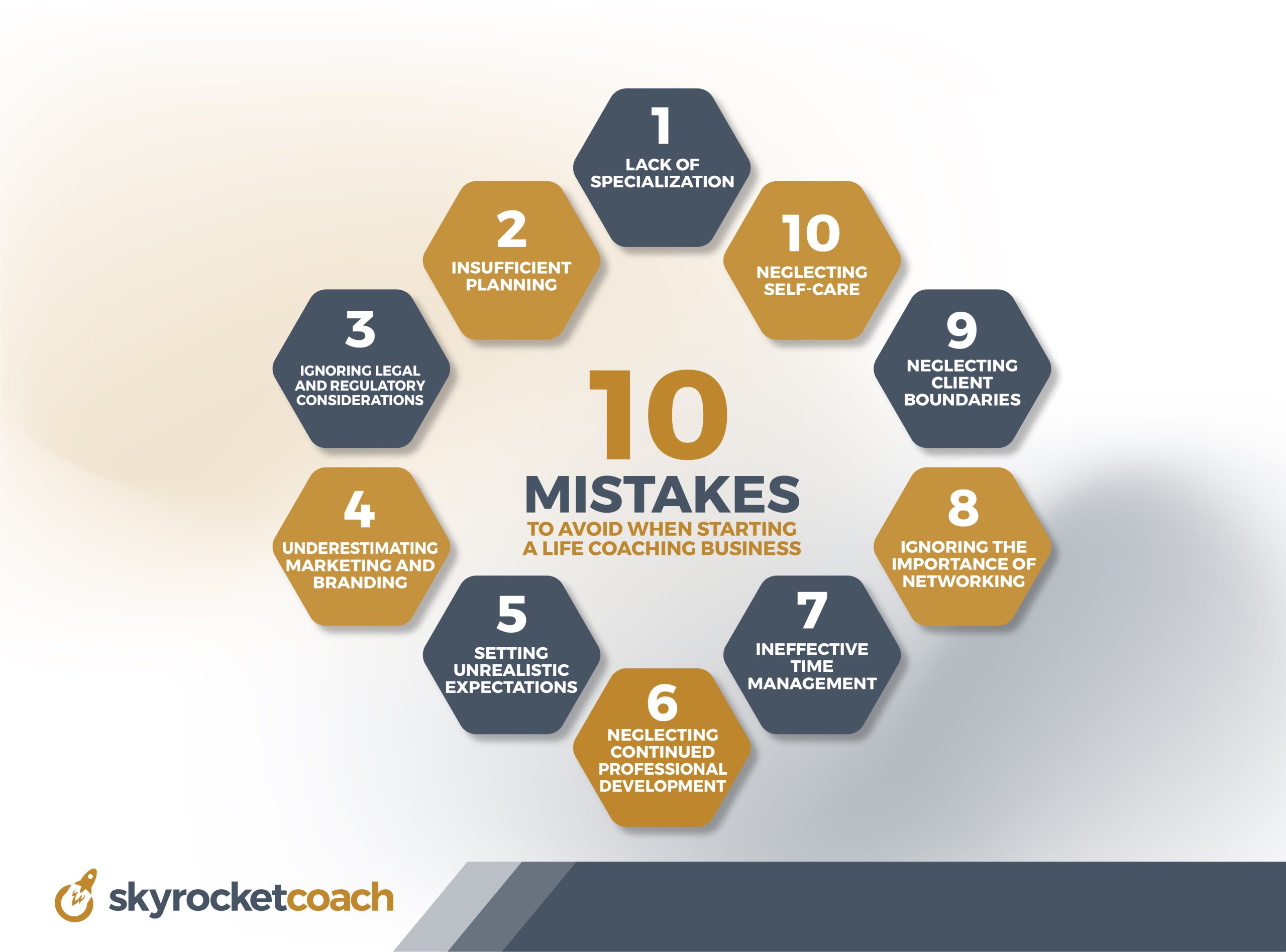Starting a life coaching business can be rewarding and fulfilling for those interested in helping others achieve their goals and improve their lives.
Life coaching has become more popular over the past few years, with more and more people looking for help and advice from coaches to get through tough times in their lives.
However, like any other business venture, starting a life coaching business comes with its own set of challenges and requires careful planning and preparation.
In this blog, we’ll explore 10 mistakes to avoid when starting a life-coaching business.
Let’s get started.
Table of Contents
The Importance Of Avoiding Mistakes In Starting A Life Coaching Business
When starting a life coaching business, one of the most important things to remember is not to make the same mistakes that many other first-time business owners do. Some of these mistakes include not conducting proper market research, underestimating the importance of branding and marketing, and not diversifying services, among others. By avoiding these mistakes and investing in a solid business plan, potential life coaches can increase their chances of success and growth in the industry.
The Benefits And Challenges Of Being A Life Coach
Being a life coach comes with its own set of benefits and challenges. On the one hand, life coaches can make a positive impact on their clients’ lives, build lasting relationships, and experience personal fulfillment.
Inversely, life coaches must constantly stay updated with industry trends, keep up with competition, and handle difficult clients or cases. However, Life coaches can get through these problems, though, if they work hard and are determined. They can also build a successful business that helps their clients and the community.
Let’s discuss starting a life coaching business checklist and how to start a life coaching business online and get clients.
Establishing Your Brand Identity
When starting a life coaching business, it’s important to establish a strong brand identity that resonates with your target audience. This can be achieved through careful consideration of your niche and target market, as well as by building a strong online presence.
-
Defining Your Niche and Target Market

To establish your brand identity, it’s important to define your niche and target market. This will help you tailor your services and marketing efforts to reach the right audience. Ask yourself what type of coaching you offer and who your ideal client is. This will shape your brand messaging and overall marketing strategy.
-
Building Your Online Presence
A strong online presence is crucial for any business in today’s digital age. Utilize social media platforms like LinkedIn, Instagram, and Facebook to build your brand and connect with potential clients. Create a website that reflects your brand identity and showcases your services. Utilize search engine optimization techniques to ensure your website is visible to those needing your services.
Financial Management
As a life coach, managing finances can be a challenging task. It is important to establish a sound financial plan for your business to ensure profitability and sustainability.
-
Setting Realistic Revenue Goals and Budgeting
When setting revenue goals, it is crucial to consider your niche, target market, and competition to set realistic expectations. Establishing a budget with expenses can help you monitor and adjust your finances accordingly. Understanding your cash flow will help you make informed decisions and stay on track toward your financial goals.
-
Minimizing and Managing Business Expenses
As a business owner, it is essential to minimize expenses and manage costs effectively. Evaluate which expenses are necessary for your operations and find ways to reduce them. Consider outsourcing or automating tasks to save time and money. This will allow you to focus on your core competencies and grow your business without the burden of excessive costs.
Legal And Ethical Considerations
-
Understanding the Legal Requirements of Running a Life Coaching Business
Successfully running a coaching business requires an understanding of legal requirements. Coaches must comply with federal, state, and local laws and regulations. Examples of legal requirements include registering for taxes, forming a business entity, obtaining required licenses and permits, and maintaining proper insurance coverage. Failure to comply with legal requirements can result in fines, legal action, and financial losses. Compliance helps build a strong and stable business that operates with integrity and credibility.
-
Maintaining Ethical Standards in Your Practice
Maintaining ethical standards is crucial in the coaching profession. Coaches must adhere to standards and ethical guidelines set forth in their practice. Examples of ethical principles include confidentiality, client welfare, informed consent, and avoiding conflicts of interest. Breaching ethical standards can result in reputational damage and legal consequences. Upholding ethical guidelines is essential to building and maintaining a positive reputation among clients and industry peers.
Professional Development And Skills Enhancement
Life coaches must constantly work on professional development to maintain their competitive edge in the market. They must stay updated with the latest trends, techniques, and tools of the industry. Coaches can attend various workshops, seminars, and conferences to enhance their skills in areas such as motivation, leadership, and communication.
-
Continuing Education and Certification Requirements

To maintain their certification and credibility, coaches need to complete continuing education requirements. The International Coach Federation (ICF) requires coaches to complete 60 hours of Continuing Coaching Education (CCE) units every three years. Some states have their own certification requirements as well. By meeting these certification requirements, coaches can assure their clients of their competence and professionalism.
-
Personal and Professional Growth
Besides attending workshops and completing life coach certification requirements, coaches must work on personal and professional growth. This can involve improving their time management, communication skills, and business acumen. Coaches can read books, enroll in online courses, or hire a mentor to receive guidance and support in their growth journey.
Leadership And Team Management
Life coaches understand that to grow their business, they must lead and manage their team effectively. They must carefully select and train new staff and contractors to ensure that they uphold the same standards of professionalism and commitment to client success. Coaches must also establish a positive and productive work environment that fosters creativity, collaboration, and accountability.
Implementing Technology And Automation
Life coaches must embrace technology and automation to maintain efficiency and adapt to the ever-changing business landscape. By streamlining administrative tasks and processes, coaches can focus on their clients and grow their business.
-
Streamlining Administrative Tasks and Processes
Technology like customer relationship management (CRM) software can help coaches track client interactions, invoices and payments, and appointment schedules. By automating tasks like email reminders for sessions or post-session surveys, coaches can save time and provide a better client experience.
10 Mistakes To Avoid When Starting A Life Coaching Business infographic

Starting a life coaching business can be a rewarding venture, but it’s important to navigate the path carefully. Here are 10 mistakes to avoid when launching your life coaching business:
-
Lack of Specialization
- Mistake: Trying to cater to everyone and everything. Don’t understand what your life coaching niches are, life coaching business model.
- Solution: Specialize in a niche where you have expertise and a passion, allowing you to stand out and attract a more targeted client base.
-
Insufficient Planning
- Mistake: Jumping into the business without a solid life coaching business plan.
- Solution: Develop a comprehensive business plan that includes your target market, marketing strategy, financial projections, and a clear mission and vision for your coaching practice.
-
Ignoring Legal and Regulatory Considerations
- Mistake: Neglecting to understand and comply with local laws and regulations.
- Solution: Consult legal professionals to ensure your coaching business meets all necessary regulations, including licensing requirements and client confidentiality.
-
Underestimating Marketing and Branding
- Mistake: Believing that clients will find you without a strong online presence.
- Solution: Invest time and resources in building a professional website, utilizing social media, and developing a powerful brand that reflects your coaching philosophy and values.
-
Setting Unrealistic Expectations
- Mistake: Expecting instant success and a full client roster.
- Solution: Understand that building a successful coaching business takes time. Set realistic goals, be patient, and focus on consistently delivering value to your clients.
-
Neglecting Continued Professional Development
- Mistake: Assuming your initial training is sufficient for your entire career.
- Solution: Stay updated on industry trends, attend workshops, and pursue additional certifications to enhance your coaching skills and remain competitive in the field.
-
Ineffective Time Management
- Mistake: Failing to prioritize tasks and manage time efficiently.
- Solution: Develop strong time management habits to balance client sessions, marketing efforts, and personal life. Consider using productivity tools to stay organized.
-
Ignoring the Importance of Networking
- Mistake: Overlooking the power of networking in the coaching industry.
- Solution: Attend industry events, join professional organizations, and build relationships with other coaches. Networking can lead to referrals and collaborations.
-
Neglecting Client Boundaries
- Mistake: Allowing boundaries to blur between your personal and professional life.
- Solution: Clearly define and communicate your coaching hours, response times, and availability. Establishing healthy boundaries is crucial for both you and your clients.
-
Neglecting Self-Care
- Mistake: Prioritizing clients at the expense of your own well-being.
- Solution: Practice self-care regularly to maintain your physical and mental health. A burnt-out coach cannot effectively support clients.
By avoiding these common mistakes, you can set a solid foundation for your life coaching business and increase your chances of long-term success.
Final Thoughts
To maximize your potential as a life coach, it is important to avoid common mistakes such as a lack of planning, undercharging, and neglecting professional development. By investing in these areas, building a strong online presence, and setting clear boundaries with clients, life coaches can build successful and sustainable businesses.
Remember, patience is key, and continuous learning is essential in this dynamic field.
For those looking to embark on their coaching journey, consider these insights to navigate the path to success. At Skyrocket Coach, we’re here to support your aspirations with expert guidance and resources.
Frequently Asked Questions About Mistakes To Avoid When Starting A Life Coaching Business
What’s the significance of specialization in a life coaching business?
Answer: Specializing in a niche enhances your expertise, setting you apart and attracting a more targeted client base.
How crucial is a business plan for a life coaching startup?
Answer: A solid plan is vital, outlining your market, marketing strategy, financial projections, and mission.
How important is branding and marketing for a life coaching business?
Answer: Strong branding and online presence are essential for attracting clients and establishing credibility.
Why is continuous professional development crucial in life coaching?
Answer: Staying updated on industry trends and pursuing additional certifications enhances coaching skills and competitiveness.
How does effective time management benefit a life coaching practice?
Answer: Prioritizing tasks and managing time efficiently ensures a balanced approach to client sessions, marketing efforts, and personal life.
Why is self-care crucial for success in a life coaching business?
Answer: Regular self-care practices are essential to maintain physical and mental well-being, preventing burnout and ensuring sustained effectiveness.




Recent Comments